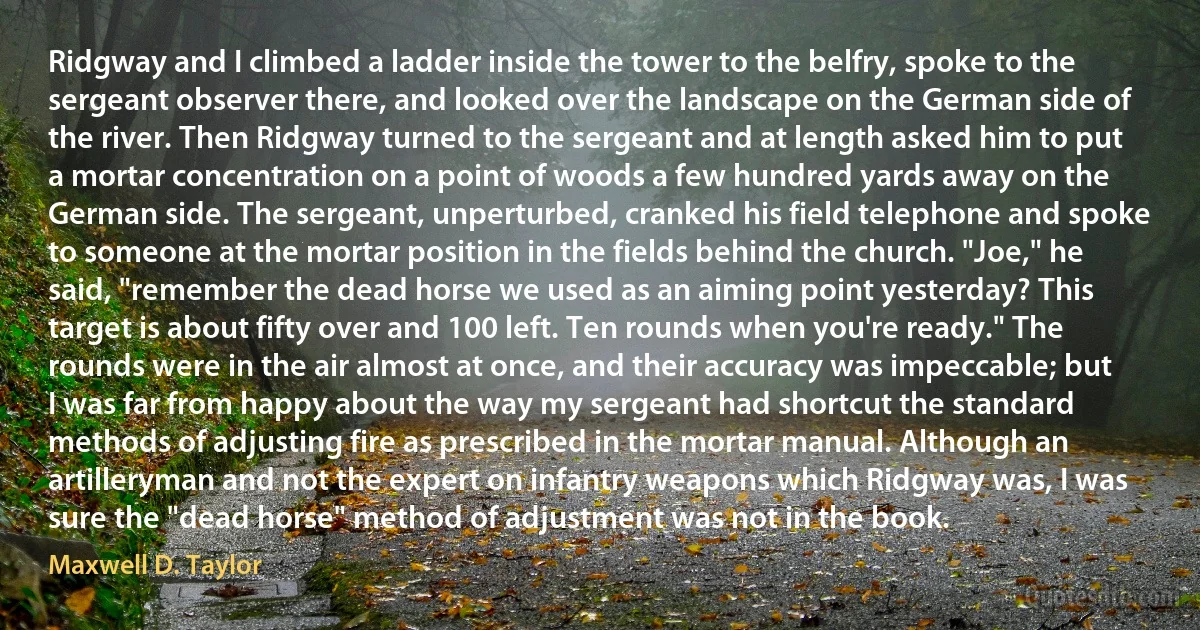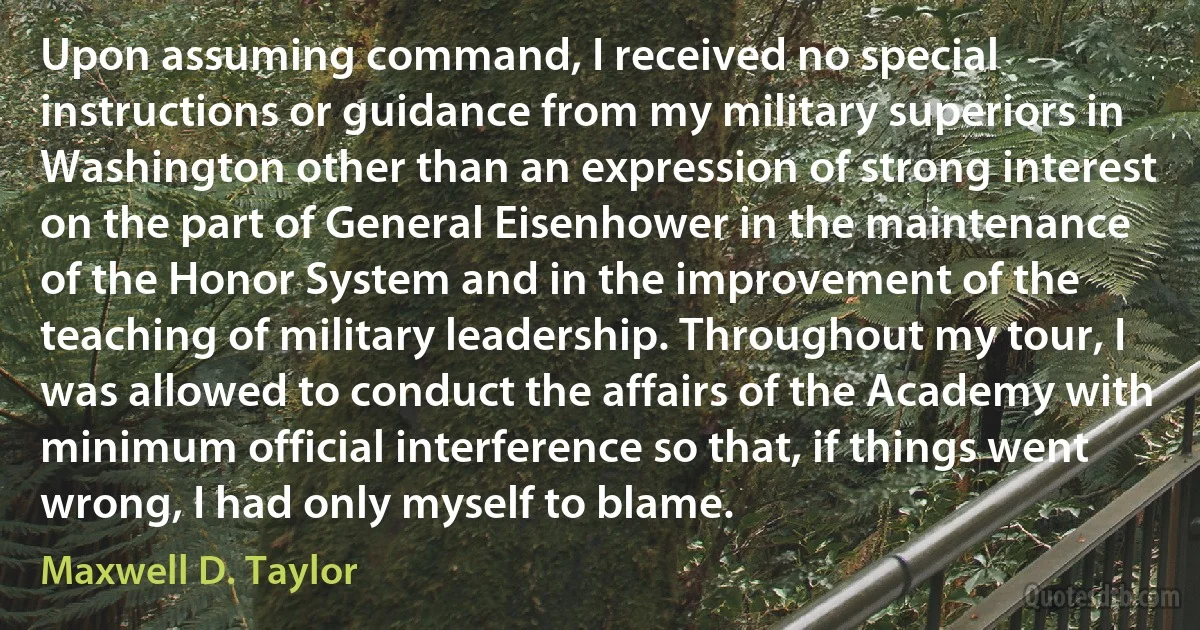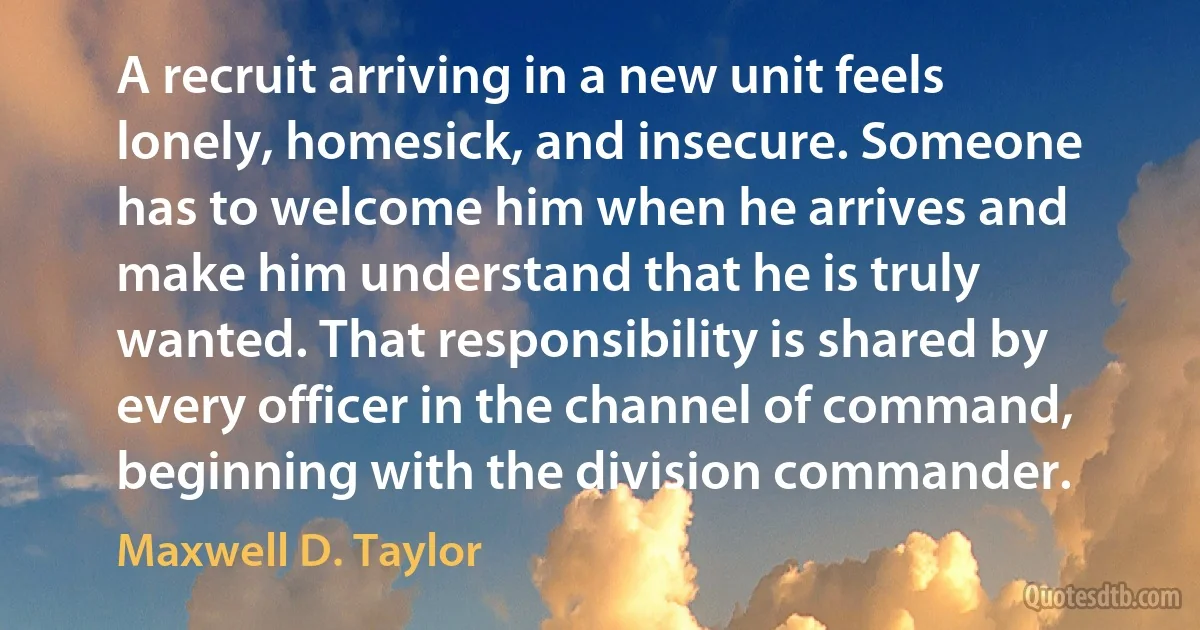Maxwell D. Taylor quotes
First, we didn't know ourselves. We thought we were going into another Korean war, but this was a different country. Secondly, we didn't know our South Vietnamese allies. We never understood them, and that was another surprise. And we knew even less about North Vietnam. Who was Ho Chi Minh? Nobody really knew. So, until we know the enemy and know our allies and know ourselves, we'd better keep out of this dirty kind of business. It's very dangerous.

Maxwell D. Taylor
When the Armistice came back no one took time to tell us about it; November 11 was just another day of drilling on the Plain. I found out that the war was over only by courtesy of our "barrack policemen", the janitor who looked after the division of the old South Barracks where my "beast" company was quartered, who reported the war's end a couple of days after the fact.

Maxwell D. Taylor
So I asked him why he had poled one of his fields and not the other of his small farm. His reply showed the folly of assuming rationality in human behavior. "The Germans told us farmers to pole all our fields by June 15. My cow never liked that west field so I poled it first." In this case, the whim of a French cow was the controlling factor, not the plans of the German General Staff. As I was about to go, the farmer asked me to wait a moment, went back into the house and returned with a clip of World War I rifle ammunition. He gave it to me with the injunction "Allez me tuer un Boche."

Maxwell D. Taylor
Of course, the media did not have to manufacture dissent and antiwar feeling in the United States; there was enough of the real article to provide them with legitimate subject matter. Every war critic capable of producing a headline contributed, in proportion to his eminence, some comfort if not aid to the enemy. Unfortunately, from 1967 onward there was no shortage of eminent figures among the opponents of the war willing to make this contribution.

Maxwell D. Taylor
I have been among the officers who have said that a large land war in Asia is the last thing we should undertake. Most of us, when we use that term, are thinking about getting into a land war against Red China. That's the only power in Asia which would require us to use forces in very large numbers. I was slow in joining with those who recommended the introduction of ground forces in South Vietnam. But it became perfectly clear that because of the rate of infiltration from North Vietnam to South Vietnam something had to be done.

Maxwell D. Taylor
We are carrying into the next decade many unresolved problems raised by Vietnam. How can a democracy such as ours defend its interests at acceptable cost and continue to enjoy the freedom of speech and behavior to which we are accustomed in time of peace? To a Communist enemy the Cold War is a total, unending conflict with the United States and its allies- without formal military hostilities, to be sure- but conducted with the same discipline and determination as a formal war. Unless we can learn to exercise some degree of self-discipline, to accept and enforce some reasonable standard of responsible civic conduct, and to remove the many self-created obstacles to the use of our power, we will be unable to meet the hard competition waiting for us in the decade of the 1970s.

Maxwell D. Taylor
When the sergeant had finally got his rounds on target and I had commended to him a thorough review of the mortar manual, I climbed down the ladder and into the courtyard just in time to rendezvous with a small German shell which exploded a few yards away, raising a cloud of dust and sending me rolling with a small fragment lodged in the sitzplatz. When I opened my eyes, there was my bug-eyed sergeant hanging out the window of the belfry calling to his radio operator, "Joe, I think the Krauts got the old man in the tail."

Maxwell D. Taylor
In such a postwar climate, it was probably natural for the U. S. to do most of its defense spending for air power and atomic weapon systems. It is true that current events, such as the Communist-led civil war in Greece, the Communist coup in Czechoslovakia and the Russian blockade of Berlin, should have been reminders of the need to meet challenges to which the Atomic bomb would be no reply. However, the lesson, if perceived, was not effective and conventional forces were sacrificed to the needs of atomic power.

Maxwell D. Taylor
All these actions will require sacrifice on the part of every one of us if we are to get over this dangerous period without intolerable risk. The simplest form of this sacrifice would be the payment of more taxes to support a larger defense budget. It is difficult to estimate how much money will be required to close the gap of our inferiority at the maximum possible rate, but I would suggest that we are talking in terms of a budget between $50 and $55 billion a year for the next five years. Once the gap is closed, subsequent budgets will not need be so high. This requirement for a bigger budget will exist regardless of any transitory shift in Soviet attitude and behavior. There is no living with communism as an inferior.

Maxwell D. Taylor
The Army which I joined in 1922 was drab and unexhilarating after West Point. Most of our citizens assumed that World War I had ended all wars and hence regarded a standing army as useful as "a chimney in summer," to use an old English phrase. Promotion was strictly by seniority, and a large bloc of contemporary officrs taken into the Regular Army at the end of the war constituted a discouraging "hump" in the promotion list just ahead of my contemporaries and me. As a result it took me thirteen years to become a captain, and such distinguished officers as Generals Gruenther, McAuliffe, Palmer, and Wedemeyer, who graduated a few years before me, took seventeen years. Under such conditions of stagnation, many of the most promising officers resigned and sought their fortune in civil life. But for some unaccountable reason a remarkable number stayed in the service to become the military leaders of World War II.

Maxwell D. Taylor
When President Kennedy sounded me out about becoming Chairman, I was of course pleased to be considered but, at the same time, felt a certain depression at the thought of returning to the bear pit of the Pentagon where I spent four less-than-happy years as Army Chief of Staff. However, I recognized that the atmosphere had changed and that the strategic heresy of Flexible Response which I had advocated to little avail had become the orthodoxy of the Kennedy Administration. Also, I had gotten to know Secretary McNamara and, in spite of the occasional differences of view, had a high regard for him as a man of decision who tackled fearlessly the tough problems of defense and refuse to yield to the temptation to sweep them under the rug.

Maxwell D. Taylor
Elements of the information media contributed to prolonging the war by their manner of reporting the news. It required only selective reporting, not deliberate fabrication, to create the impression that we Americans were the prime aggressors bent on expanding the war to avoid impending defeat, and that our alleged successes were really defeats which officials were trying to hide from the American public. Biased reporters found no good to say about our Vietnamese allies, whom they held up to scorn in a way which led the American people to believe that our allies were not worth the sacrifices we were making in their behalf. Such selective and slanted reporting spread defeatism among the tender-minded at home and provided enormous encouragement for Hanoi to hold fast and concede nothing.

Maxwell D. Taylor
Market-Garden was the biggest airborne operation of World War II, which is to say of all time. The D-day assault included 20,000 parachutists, some 1,500 transport planes, and about 500 gliders, and was protected by over 1,000 Allied fighters. In this D-day landing the 101st had over 400 C-47 transport aircraft and 70 gliders carrying nearly 7,000 officers and men. The remainder of the division arrived progressively by air and ship over the next six days. Our initial mission was to secure fifteen miles of highway extending from Eindhoven to Veghel and to seize and hold the bridges in the area for use of the spearhead units of the British Second Army advancing from the south. Although our objectives were scattered, I insisted on putting all the troops arriving the first day into a compact area between Zon and Veghel in order to have them within supporting distance of each other at the outset.

Maxwell D. Taylor
A standard question for a new man was why he had volunteered for parachuting and whether he enjoyed it. On one occasion, a bright-eyed recruit startled me by replying to the latter question with a resounding "No, sir." "Why, then, if you don't like jumping did you volunteer to be a parachutist?" I asked. "Sir, I like to be with people who do like to jump," was the reply. I shook his hand vigorously and assured him that there were at least two of us of the same mind in the Division.

Maxwell D. Taylor
The ultimate guide to decision should be our estimate at the time of the nature and extent of the American interest. There may be good reasons to use our resources to resist a troublemaking power which commits aggression against a weak and friendly state if the subversion of that state would be a significant gain to the troublemaker or a significant loss to us. Even then, we should have a reasonably accurate and encouraging estimate of the chances of success before we act. We cannot afford to stake our world standing on a lost cause or on one with unduly high risks of failure.

Maxwell D. Taylor



